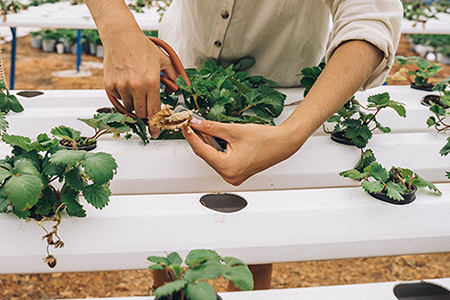Hydroponic gardening is a popular method of growing plants without the use of soil, relying instead on a nutrient-rich water solution to nourish the plants. However, one challenge that hydroponic growers often face is pest control. Without the natural barriers that soil provides, pests such as aphids, spider mites, and whiteflies can quickly infest a hydroponic system and damage crops.
Fortunately, there are several effective methods for controlling pests in a hydroponic garden without resorting to harmful chemical pesticides. From introducing beneficial insects that eat pests to using organic sprays and traps, hydroponic growers have a variety of options for keeping their plants healthy and pest-free. In this article, we will explore some of the best practices for hydroponic pest control to help you maintain a thriving indoor garden.

Introducing Beneficial Insects
One effective method for controlling pests in a hydroponic garden is to introduce beneficial insects that act as natural predators to the harmful pests. Ladybugs, lacewings, and predatory mites are all examples of beneficial insects that can help keep aphids, spider mites, and other common pests at bay. These insects can be purchased from reputable suppliers and released into the hydroponic system where they will feed on the pests, helping to maintain a healthy balance in the garden. By using beneficial insects as part of an integrated pest management strategy, hydroponic growers can minimize the need for chemical pesticides and promote a more sustainable approach to pest control. For more information on incorporating beneficial insects into your hydroponic garden, check out Hydroponic Pest Control Solutions.
Organic Sprays and Traps
Another effective method for controlling pests in a hydroponic garden is to use organic sprays and traps that target specific types of pests without harming the plants. Neem oil, insecticidal soap, and diatomaceous earth are all examples of organic treatments that can effectively manage pests in a hydroponic system. These natural remedies work by disrupting the pest’s life cycle or creating a physical barrier that prevents them from infesting the plants. Additionally, sticky traps can be used to capture flying pests like whiteflies and fungus gnats, helping to reduce their populations in the growing environment. By incorporating organic sprays and traps into their pest management routine, hydroponic growers can protect their crops while maintaining a chemical-free growing environment. For a selection of organic pest control products for your hydroponic garden, visit Hydroponic Pest Control Solutions.
In conclusion, effective pest control methods are essential for maintaining a thriving hydroponic garden. By incorporating beneficial insects, organic sprays, and traps into their pest management routine, hydroponic growers can protect their crops without resorting to harmful chemical pesticides. These natural and sustainable approaches not only help to keep pests at bay but also promote a healthier growing environment for plants. With the right tools and strategies in place, hydroponic growers can successfully control pests and ensure the success of their indoor garden.
